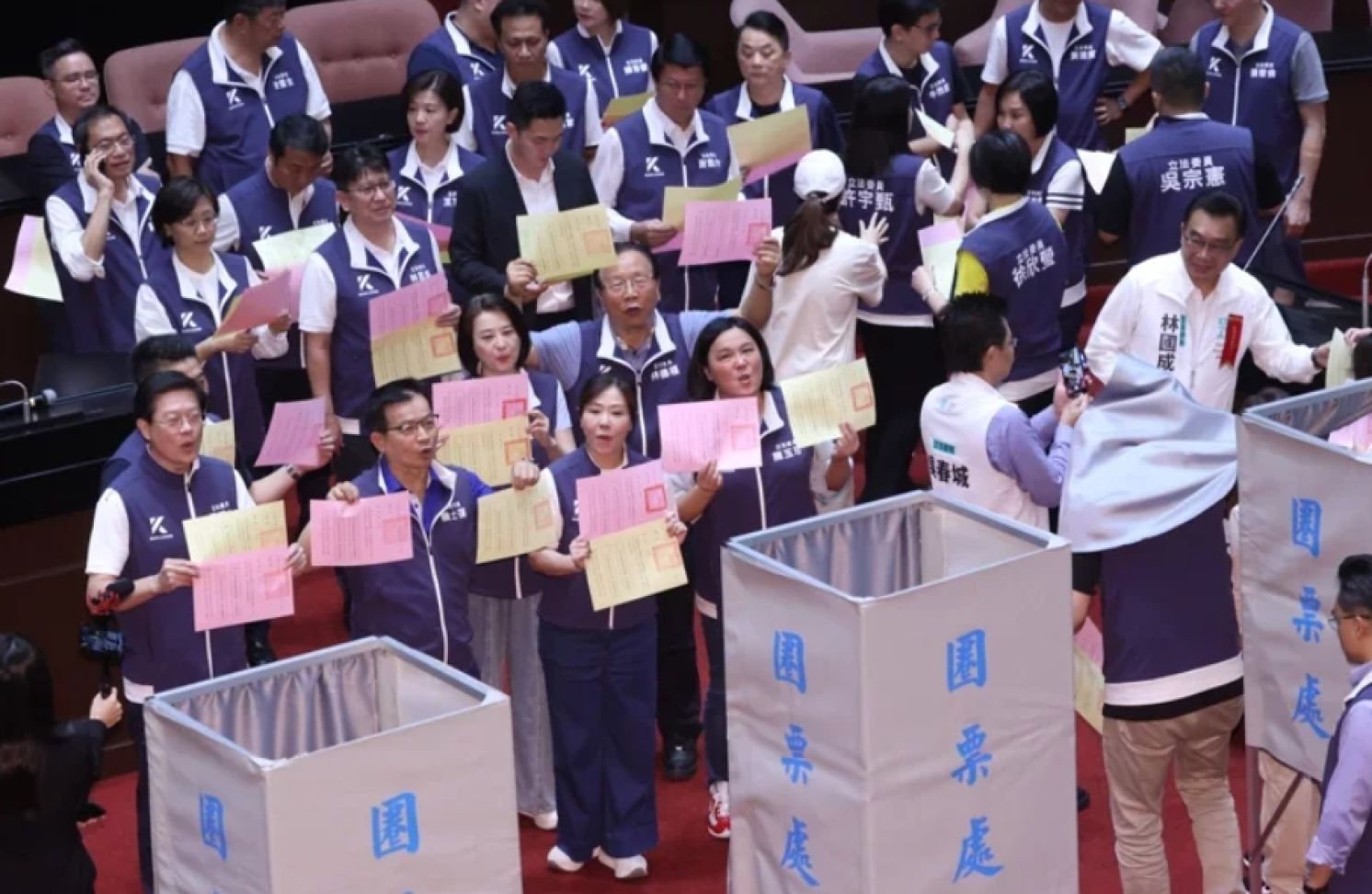
Seizing Electoral Rights through "Recall":The DPP's Predatory Democracy
United Daily News Editorial, June 27, 2024
Just after the presidential and legislative elections in January this year, less than five months after new legislators took office, the ruling Democratic Progressive Party (DPP), the second largest party in the Legislative Yuan, is unwilling to accept defeat and is preparing to use “recalls” to oppose the legislative reform bills. The DPP’s “removal list” has begun to circulate on the Internet, mainly targeting the Kuomintang (KMT) committee members with a smaller lead in votes or who have lower popularity in specific constituencies. Not capitulating, the KMT also proposed a “removal list” in response. Considered from any perspective, the immediate removal of legislators who have only been in office for a few months is not simply an “evil” act, but also detrimental to democracy.
The Cho cabinet knew that the Executive Yuan's return of the legislative reform bills for reconsideration was unlikely to change the result, but nevertheless still insisted on proposing it. The main purpose of this was to stir up confrontation and fuel the general “recall” wave that will start in February of next year. President Lai Ching-te furthermore led the Office of the President, Executive Yuan, the DPP, and the Supervisory Committee to propose an inquiry into a supporting interpretation of the constitution, based on the same strategy. Once the “recall” war begins, perhaps the DPP will be able to regain its position as the largest occupying party in the Legislative Yuan. Before the results of the Constitutional Court’s interpretation of the constitution are released, the ruling and opposition parties will continue to be caught in a stalemate. However, after the results are released, the two sides will enter a “recall” war, and Taiwan's politics will no longer be peaceful.
Among the world’s democracies, Taiwan is probably the only one that routinely uses “recall.” What started the mass “recall” phenomenon in Taiwan were the parliamentary removals after the 2014 Sunflower movement. Pro-DPP groups launched a campaign to target a number of KMT legislators for collective “recall.” Although the removal attempts ultimately failed, at the end of 2016 the Election and Recall Act was revised in order to lower the threshold for “recall.” Since then, successive “recall” actions by the ruling and opposition parties have been difficult to contain. For example, then-Kaohsiung Mayor Han Kuo-yu, who lost the 2020 presidential election, became the first mayor to be removed by recall. Later, DPP Taoyuan City Councilor Wang Hao-yu was then dismissed. After that Chen Po-wei of the Taiwan Statebuilding Party became the first legislator to be removed by recall
As cases of successful “recall” have increased, the "power of recall" has come to be constantly abused by politicians or political groups. For this reason, the DPP is deliberately planning a general “recall” operation in February next year. Such abuse of the “recall” system constitutes two serious infringements on democratic politics. Firstly, using “recall” as a political instrument to sabotage election results is a barbaric act. Second, the “power of recall” was originally designed and intended to allow electors in the "original constituency" to reverse their authorization for specific elected public officials through “recall”. However, the “power of recall” is now being manipulated by political parties or other non-constituency groups, resulting in the interests of a few overriding the original democratic voters’ wishes with harmful consequences.
Moreover, in other democracies, when “recall” is exercised, the elected public officials are usually removed due to corruption, malfeasance, misconduct, or administrative acts contrary to the will of voters and local interests. But in Taiwan, “recall” actions have become indiscriminate mobilizations of hatred between political parties, which seriously violates the design and spirit of the “recall” system. This time, the DPP’s “recall” targets have nothing to do with the behavior and deeds of those officials. It is simply that the other party is “easy to strike” with this approach, which will enable the removal of many people as soon as it takes action. What kind of crude behavior is this that robs democracy?
It should also not be forgotten that the “recall” system was proposed mainly to address the shortcomings of the electoral system and give voters the opportunity to eliminate unworthy public officials. In other words, the right to vote should be the primary democratic tool, and the right to “recall” is merely a supplementary and remedial tool. The DPP, however, has turned its back on voters and blatantly used the power of “recall” as a tool of revenge for its inability to win favorable public opinion. If it loses an election, it will simply use the power of “recall” to win it back. Does this kind of political party, which only knows how to compete for power, still retain any democratic spirit?
The recent campaign in Keelung to “recall” Mayor Hsieh Kuo-liang has been in full swing, and the threshold for passing the second phase of petitions is not far off. During this period, politicians from the DPP openly and often advocated for the motion, and some groups even went to the Taipei Metro Station to stoke petitions. All this shows that “recall” has gradually lost the spirit of “original constituency” and “voter initiation.” The DPP is now on a rampage, regarding the Hsieh “recall” as a prelude to an even uglier subsequent robbery of democracy.